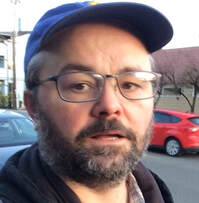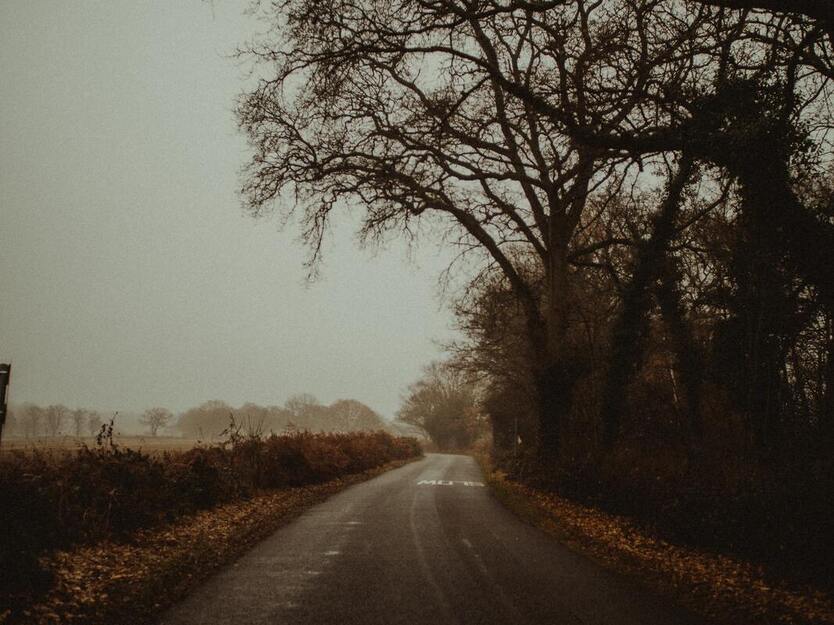|
10/29/2019 Colorado by Edwin StaplesColorado I was the emergency contact for your apartment in Colorado Springs. The news came to me three hours after the first responders got to you. I was starting my morning in Seattle, at a cubicle farm with a bay view, cracking jokes with my friends about their long commutes, the sudden arrival of autumn weather, and the drizzle. The phone rang but I ignored it. I was no more than 10 years old when you showed me brief passages from Kurt Vonnegut, Jr’s Breakfast of Champions. I understood the sentences, or I thought I did. There were pictures, with pithy commentary. You laughed at parts I didn’t think were funny, but I felt grown up. You told me I was capable of lots more than primary school could offer. Just wait, you said. The world has so much more, once we get out. You were seven years older. Old enough to see the lighted exit signs that pointed the way out of the stifling small town. The phone buzzed the voicemail buzz. I said, “where is 303? Baltimore?” Everybody on this floor was phone help. They were helping customers so no one answered. The incoming call was not an 888 or an 800, which were always junk. I’d been getting Mandarin-speaking sales people calling at random. It was a near-miracle that I didn’t delete the voicemail without playing it. When I was 16, I visited your apartment in the city and talked about what to do when I was done with school, and what I should do to help out Ma and Dad with their financial worries. Was I supposed to be “kicking in” as the siblings before me had done? You laughed and shook your head. “You don’t have to be an adult until you’re an adult. Just go to school, run around with your friends, kiss girls, do all the silly stuff. The weight of the world isn’t your burden. You take care of you.” I said I’d have to go to state school, even though the teachers thought I could get into a private college. There was no way either parent was going to offer a dime to help pay for it. “Forget about cost. Apply to a college you want to go to. Find the teacher you admire most and ask him where you should study. When the time comes, ask me for help. I’ll show you how to get scholarships and grants.” What’s a grant? I probably replied. A woman named Amanda identified herself on the voicemail as a deputy from El Paso County, Colorado. Please call me. End of message. I was in Colorado only ten days earlier. Did I run a red light? Would a county deputy call about a moving violation? Did I witness something without realizing it? I never thought about that thing you said the last time I saw you, that you were living in different places around the American West, taking long-term assignments to set up big networked software for government contractors. In later years, we weren’t close. I was in the habit of telling friends and relations that you were still “out in the wilderness,” and that you had been there since about 1990, when that explosive letter hit the family. You changed your name, you told everyone you were part of a religious fellowship called the Rosicrucians. With other members of the church, you claimed to be reincarnated, and to know your identities from more than one past life. I called the 303 number and asked for Amanda. “I’m the deputy coroner for El Paso County, Colorado,” she said. All the stuff she was about to say came to me before she said it. “You are related to Louise V--?” she asked, her voice coroner-professional, with that distant hint of empathy, but all business in the foreground. “She’s my sister,” I answered. Reality got wobbly. I wished I was in a place where nobody else could hear my call. “I’m sorry,” she said. “I’m sorry,” said the phone-help person nearest me, finished on her own phone call, and having heard my repeat back to Amanda the circumstances of your 9-1-1 call, the visit by the paramedics, the declaration by the coroner, the conversation with the apartment manager, Brenda. “I’m sorry,” said the guy I usually ate lunch with, his palms held skyward. Four times I tried to leave the building where I worked, and four times I traipsed back to my desk, hands shaking. I forgot my phone, I forgot my badge, the phone rang, the phone rang again. The elevator wouldn’t come. My memory quit on me for a while, then I was on the couch at home. It took a fair amount of coaching to get me back to visiting with you face-to-face after the 1989 stuff. In 1989, our sister Liz died. Within weeks, you wrote that letter to the family. It declared both parents and one other sibling guilty of destroying your psyche years earlier. You named the price of reparation: $15,000. I was horrified to read what you had written, and doubly horrified that, beneath the denials, beneath the shock of other family members, I saw the actions, and heard the words of people with burdened consciences. There was little room to doubt that my parents blamed themselves for something awful done to you. Colorado is beautiful to visit in September. High country. Birds everywhere, distant peaks forming lovely shadows when the sun was low, strange flowers that only grow in the mountains, and air that seems cleaner than anywhere else. I drove around the town, finalizing all your business, returning your security badge to your employer, calling back home to report my progress, wishing there was a way to make the sun less sunny. People asked me what brought me here, as if I had an out-of-towner stamp on my forehead. Maybe it was my driving around in a rental car at 10:00 AM, wearing sweat pants, eyes red and puffy, voice polite but thin and breathy. In 2000 when Dad died, another group communication. This one went to Dad’s elderly siblings. It accused him of the crimes previously attributable to our formerly-accused sibling. The letter hit the family a day before Dad died. This letter also asked for money. I’ve had plenty of therapy since then. It’s how I ended up having dinner with you, the last time you passed through town, 27 months before the phone call from Amanda the deputy coroner. In the days following the call, there was plenty of time--between more phone messages, airplane flights, and calls-back from the routine professional handlers of death--time to consider whether I had reached out into your wilderness well enough to let myself sleep at night. This was a foolish question. All the questions were foolish. Nothing that transpired since the age of ten, the first time you told me I could go places, would have the power to change the plain fact, that one day you would exit this life, and on that day there would be a hole in my life big enough to drive that rental car right through.  Edwin Staples and his wife, Rachel, live and work in Seattle, Washington. They served together as Peace Corps volunteers in two countries: the Solomon Islands and Suriname. Edwin has been writing long and short fiction since his youth. He was chief editor of the Quill literary magazine while a student at Bowdoin College.
Corwin Ericson
11/8/2019 07:27:26 am
This is powerful, plainspoken, direct and lyrical all at once. Thank you, Edwin. 12/2/2019 01:29:18 pm
Edwin wrote powerful, plainspoken, direct and lyrical all at once. There are no better words. This is great writing. Great Prose! Comments are closed.
|
AuthorWrite something about yourself. No need to be fancy, just an overview. Archives
April 2024
Categories |

 RSS Feed
RSS Feed
